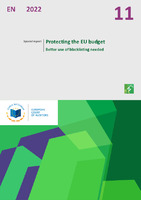| dc.description.abstract | The EU and the Member States are jointly responsible for protecting the EU’s
financial interests with respect to EU funds. “Blacklisting” (or exclusion) is a key tool
that international bodies and national authorities use to protect their public finances.
The objective is to avoid entering into financial agreements with untrustworthy
counterparties, such as those involved in fraud, corruption, professional misconduct,
money laundering, or non-payment of taxes. In 2020, the EU paid out around
€150 billion under financial agreements. Since 2016, the Commission has been
responsible for operating the Early Detection and Exclusion System (EDES) for the
quarter of EU spending (€39 billion) that it manages directly or indirectly through
implementing partners in line with the EU’s financial rules. For the three quarters of EU
spending involving national authorities (€111 billion), Member States have to follow
exclusion-related obligations but they are not required to set up exclusion systems or
databases per se. |

